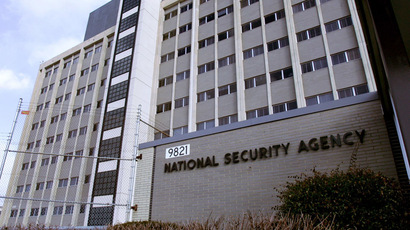White House, senators call for end to NSA phone data collection as Patriot Act renewal looms

A handful of US senators used a series of speeches to denounce the NSA’s ability to collect mass amounts of Americans phone data. The White House joined them in pushing for NSA reform while also advocating the renewal of key Patriot Act provisions.
The White House and the five senators – Democrats Richard Blumenthal and Patrick Leahy and Republicans Steve Daines, Dean Heller, and Mike Lee – are in support of NSA reform through the USA Freedom Act, which would curb the collection of telephone metadata. Instead, the NSA would have to acquire a warrant every time it wanted to access phone records, which would be held by telephone companies.
The bill would also extend certain expiring provisions of the Patriot Act, the government surveillance law passed in the wake of the September 11, 2001, attacks in New York City and Washington, DC.
READ MORE: Surveillance reform? Intense lobbying battle brewing over Patriot Act expiration
“The administration applauds and appreciates the strong bipartisan and bicameral effort that led to the formulation of this bill, which strikes an appropriate balance between significant reform and preservation of important national security tools,” the White House said Tuesday.
“The USA Freedom Act's significant reforms would provide the public greater trust and confidence in our national security programs and the checks and balances that form an integral part of their operation," the White House added. “The administration supports swift House passage of the USA Freedom Act, and urges the Senate to follow suit.”
The senators took to the Upper Chamber on Tuesday to herald the bill as a way of protecting the privacy rights of Americans and to oppose any "clean," or amendment-free, reauthorization of the Patriot Act.
"We know that for years the NSA collected metadata about billions of emails sent by innocent Americans using the same justification," Leahy said, according to The Hill. "Should we allow the government to sweep up all of our credit card records? All of our banking or medical records?... Enough is enough."
Senate Majority Leader Mitch McConnell, though, does not support the USA Freedom Act. Instead, he wants to allow the NSA to maintain its vast surveillance regime through a five-year, "clean" reauthorization of the Patriot Act.
McConnell and his supporters in the Senate – including Republican presidential candidate Marco Rubio – say the NSA needs to continue bulk collection of phone data to protect the US from another terror attack.
The USA Freedom Act “will neither keep us safe nor protect our privacy,” McConnell said last week.
READ MORE: Reforming NSA's phone data collection program will cost $15 million - CBO
Heller said that he and fellow backers of the USA Freedom Act are "not here to strip the intelligence community of the tools to fight terrorism. ...What we are here to do is to provide the American people with the certainty that the federal government is working without violating their constitutional rights."
Lee said Tuesday that even if the NSA is not abusing its surveillance abilities currently, it could happen at any moment.
"Who's to say that the NSA will always be inhabited by such people? Who's to say what the state of affairs will be a year from now?" he said. "We know in time that people tend to abuse these government programs. ... It's not a question of if things like this will be abused, it's a question of when."
Leahy said he does not "accept that they will be very careful to make sure nothing happens to the secret data."
The House of Representatives is scheduled to vote on the USA Freedom Act on Wednesday, where it is expected to pass. Though the Freedom Act has garnered some support from privacy groups, such as the Electronic Frontier Foundation, senators like Republican Rand Paul and Democrat Ron Wyden have been critical of it for not going far enough. It’s unclear if they would also resist granting this bill a vote in the Senate.
READ MORE: NSA surveillance reform in air as lawmakers threaten Patriot Act renewal filibuster
Last week, a ruling by the Second Circuit Court of Appeals found that the NSA’s phone metadata collection program is not permitted by the Patriot Act, which the agency has leaned on repeatedly for justification. The court said that the NSA could continue this bulk collection method if explicitly authorized by Congress, meaning lawmakers would have to insert that authority into any straight renewal. The bulk collection program was first exposed in 2013 through revelations supplied by former intelligence contractor Edward Snowden.
The Patriot Act's provisions are set to expire on June 1.
Sen. Paul, who is also running for the Republican nomination for president, said he will try and stop Congress from reauthorizing the law without changes.
“I'm going to lead the charge in the next couple of weeks as the Patriot Act comes forward,” he said to the New Hampshire Union Leader. “We will be filibustering. We will be trying to stop it. We are not going to let them run over us. And we are going to demand amendments and we are going to make sure the American people know that some of us at least are opposed to unlawful searches.”
The USA Freedom Act would also reform the Foreign Intelligence Surveillance Court (FISA court) by setting up a five-person panel that would offer advise when intelligence agencies are seeking new interpretations of existing law. The FISA court has accepted and approved the vast majority of government surveillance requests.














